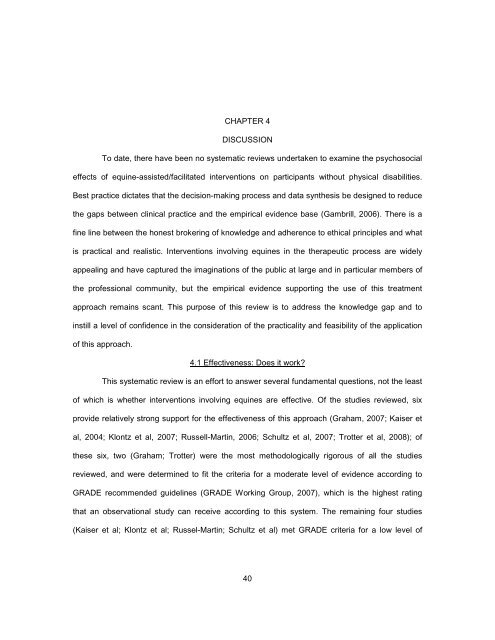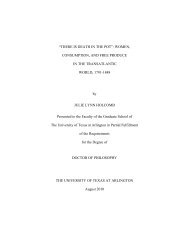A SYSTEMATIC REVIEW OF THE EFFECTS OF PSYCHOTHERAPY ...
A SYSTEMATIC REVIEW OF THE EFFECTS OF PSYCHOTHERAPY ...
A SYSTEMATIC REVIEW OF THE EFFECTS OF PSYCHOTHERAPY ...
You also want an ePaper? Increase the reach of your titles
YUMPU automatically turns print PDFs into web optimized ePapers that Google loves.
CHAPTER 4<br />
DISCUSSION<br />
To date, there have been no systematic reviews undertaken to examine the psychosocial<br />
effects of equine-assisted/facilitated interventions on participants without physical disabilities.<br />
Best practice dictates that the decision-making process and data synthesis be designed to reduce<br />
the gaps between clinical practice and the empirical evidence base (Gambrill, 2006). There is a<br />
fine line between the honest brokering of knowledge and adherence to ethical principles and what<br />
is practical and realistic. Interventions involving equines in the therapeutic process are widely<br />
appealing and have captured the imaginations of the public at large and in particular members of<br />
the professional community, but the empirical evidence supporting the use of this treatment<br />
approach remains scant. This purpose of this review is to address the knowledge gap and to<br />
instill a level of confidence in the consideration of the practicality and feasibility of the application<br />
of this approach.<br />
4.1 Effectiveness: Does it work?<br />
This systematic review is an effort to answer several fundamental questions, not the least<br />
of which is whether interventions involving equines are effective. Of the studies reviewed, six<br />
provide relatively strong support for the effectiveness of this approach (Graham, 2007; Kaiser et<br />
al, 2004; Klontz et al, 2007; Russell-Martin, 2006; Schultz et al, 2007; Trotter et al, 2008); of<br />
these six, two (Graham; Trotter) were the most methodologically rigorous of all the studies<br />
reviewed, and were determined to fit the criteria for a moderate level of evidence according to<br />
GRADE recommended guidelines (GRADE Working Group, 2007), which is the highest rating<br />
that an observational study can receive according to this system. The remaining four studies<br />
(Kaiser et al; Klontz et al; Russel-Martin; Schultz et al) met GRADE criteria for a low level of<br />
40
















